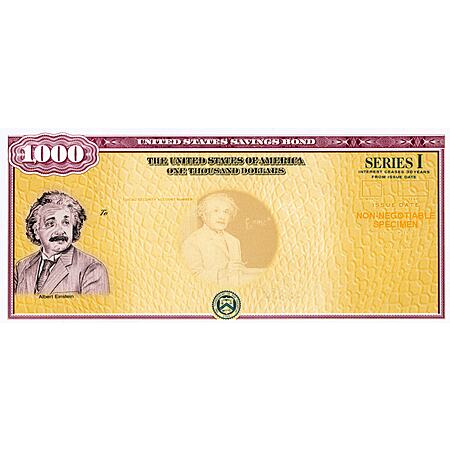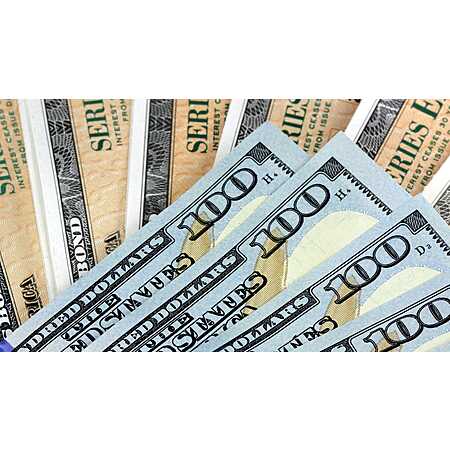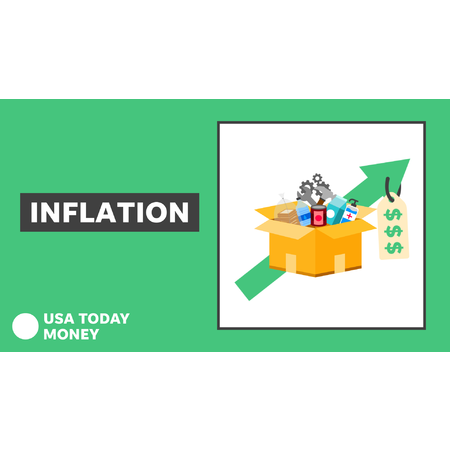Note: This popular deal is still available.
U.S, Government Treasury is currently offering
7.12% Interest Rate in combined
Fixed + Inflation Rate Earnings valid on newly issued
Series I Savings Bonds purchased from November 2021 through April 2022. Limit of $10,000 / year in interest earnings per person.
Thanks to community member
dn90003 for sharing this offer.
About this offer:- How do I buy a Series I bond?
- Must register or sign-in to your free TreasuryDirect.gov account and link a bank account.
- Click here to view a Guided Tour
- What is a Series I bond? (source)
- "A savings bond that earns interest based on combining a fixed rate and an inflation rate."
- You may use Series I bonds to:
- Save in a low-risk product that helps protect your savings from inflation
- Supplement your retirement income
- Give as a gift
- Pay for education
- Click here for more information about Series I Bonds
- What interest does a Series I bond earn? (source)
- A combination of a fixed rate that stays the same for the life of the bond and an inflation rate that is set twice a year.
- For bonds issued from November 2021 through April 2022, the combined rate is 7.12%



Leave a Comment
Top Comments
In case you're wondering, here's how the rate is computed:
Composite rate =
I bought $10k in denominations of 2,3, 5 so if I want to cash out I can do it in chunks instead of having to cash out $10k.: Better than any CD or bank rate if you want to stay in cash.
https://www.treasurydir
3,498 Comments
Sign up for a Slickdeals account to remove this ad.
This is the instructions from SD:
"How do I buy a Series I bond?
Must register or sign-in to your free TreasuryDirect.gov account and link a bank account.
Electronically: Online via TreasuryDirect (including through payroll direct deposit)
Paper: By mail when you file your federal tax return
Click here to view a Guided Tour"
I clicked on the Guided Tour. I have followed all the steps in the Guided Tour. My bank account has been linked to my Treasury account which has a Treasury account number created. I was able to log in to my Treasury account. The next step is how do I fund the money. Is $10k the limit one can fund? Thanks.
I guess to buy Series I Savings Bonds, click on the tab 'BuyDirect' next to 'My account' tab and enter the purchase amount max of $10k?
Then your money will grow (before penalty) = 100 * (1 + 7.12%/2) * (1 + r2/2) * (1 + r3/2) * ..., where each ( ) is 6 month period. As you can see, it's compounded every 6 months.
But you can wait to transfer it, don't know what your thought process is with such an incomplete question.
Math alert:
The compound interest formula is P(t) = P0*(1 + rate/n)^(nt) where the rate is given for some set time (usually a year) and n is the number of times it's compounded. t is the amount of rate periods. So for this bond, the value after t years (assuming it's constantly 7%) is <initial amount> *(1+.07/2)^(2t). In 30 years, that $100 would grow to about $788. (Again, assuming a constant 7%.) If you kept it in for 15 years, however, it would only be worth $281. Such is the power of time with compounding interest. Essentially, a 7% interest rate means that your money doubles every decade, ignoring inflation.
More math alert:
Because Euler's number "e" is the limit of (1+1/n)^n as n approaches infinity, this formula approaches P(t) = Pe^(rt), a formula you may have learned in HS algebra class. This is basically what you'd make if the interest were calculated every instant of every day. You don't actually make infinite money because the rate gets broken up into so many pieces. And if you want to go into a really deep rabbit hole, this irrational number that's used to easily estimate interest rate payouts (at least, if you have a decent calculator) rears its head in some really bizarre "different" cases -- like how likely it is to go 0-for-n when playing a game that has a fixed probability of you winning. It even shows up all the time (usually as its counterpart "natural log," or ln) in optimization problems.
"Limit of $10,000 / year in interest earnings per person."
This is poorly worded as it indicates that you can only earn 10K yearly in interest.
If I read the actual deal properly the limit is actually a purchase of $10K/year/SSN.
These are drastically different numbers, so I think the OP should be updated to prevent any confusion.
Sign up for a Slickdeals account to remove this ad.
"IF SERIES EE OR SERIES I BONDS ARE CASHED IN to pay for qualifying higher-education costs, taxpayers can exclude the accumulated interest from their income."
https://www.journalofac
"IF SERIES EE OR SERIES I BONDS ARE CASHED IN to pay for qualifying higher-education costs, taxpayers can exclude the accumulated interest from their income."
https://www.journalofac
There are qualifications you need to meet now. From a more recent Klipinger article:
If you cash in I bonds or EE bonds issued after 1989 and use the money for eligible college costs, you may not have to pay taxes on the interest you earned. To qualify for the tax break, the bond owner must use the money to pay qualified education expenses for himself, his spouse or a dependent (tuition and fees qualify; room and board do not). The owner also must have been at least 24 years old when the bond was issued. That means the bonds must generally be owned by a parent, not a child. The child can be a beneficiary of the bonds but cannot be a co-owner.
You must also meet income requirements to qualify. You can qualify for the full interest exclusion if your modified adjusted gross income in 2016 is less than $116,300 if married filing jointly or $77,550 for single filers. You can take a partial exclusion if your income is less than $146,300 for joint filers or $92,550 for single filers. The tax break disappears if your income is higher than that.
EDIT to add link: https://www.kiplinger.c
Anyway, there was one optimization we figured out back then which apparently hasn't changed: bonds earn interest from the 1st day of the month they are purchased. In other words, you buy on 12/31, you earn interest as if you bought 12/1. It was a very big deal when using credit cards, we even line up the closing dates on our FBB cards to time it so the purchase hit at start of cycle and we'd get nearly two months of float. In other words you would have effectively held the bonds for nearly three months before having to pay. But it's still important now, not just for interest calculation purposes, but also because I think this is the date from which the 12mo/5yr counter starts -- not the actual purchase date? In other words, buy today, you can cash out on 12/1/22 or 12/1/26, not have to wait til 12/18/22 or 12/18/26?
I googled to see if this "earns from the first" rule still applies; it apparently does:
https://www.treasurydir
UPDATE: interesting (no pun intended), they only compute interest semiannually though. It used to be monthly interest accrual, only the rate changed every 6/3 months (forget which). This suggests there could be an interesting play in April here; if inflation looks like it has subsided, buy before May 1 to lock this high rate in until 11/1/22. Indeed, that could turn out to be the optimal play here? All depends on the macroeconomic outlook in April ...
Anyway, there was one optimization we figured out back then which apparently hasn't changed: bonds earn interest from the 1st day of the month they are purchased. In other words, you buy on 12/31, you earn interest as if you bought 12/1. It was a very big deal when using credit cards, we even line up the closing dates on our FBB cards to time it so the purchase hit at start of cycle and we'd get nearly two months of float. In other words you would have effectively held the bonds for nearly three months before having to pay. But it's still important now, not just for interest calculation purposes, but also because I think this is the date from which the 12mo/5yr counter starts -- not the actual purchase date? In other words, buy today, you can cash out on 12/1/22 or 12/1/26, not have to wait til 12/18/22 or 12/18/26?
I googled to see if this "earns from the first" rule still applies; it apparently does:
https://www.treasurydir
UPDATE: interesting (no pun intended), they only compute interest semiannually though. It used to be monthly ...
The buy later in the month has never changed but due to the ACH component, you should buy a day or two prior to the end of the month to allow the transaction to be completed for that month.
The buy later in the month has never changed but due to the ACH component, you should buy a day or two prior to the end of the month to allow the transaction to be completed for that month.
Sign up for a Slickdeals account to remove this ad.
Leave a Comment